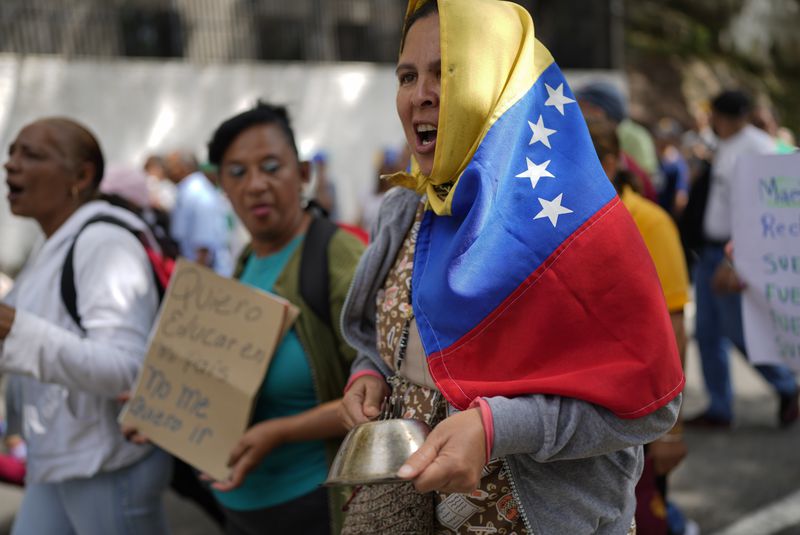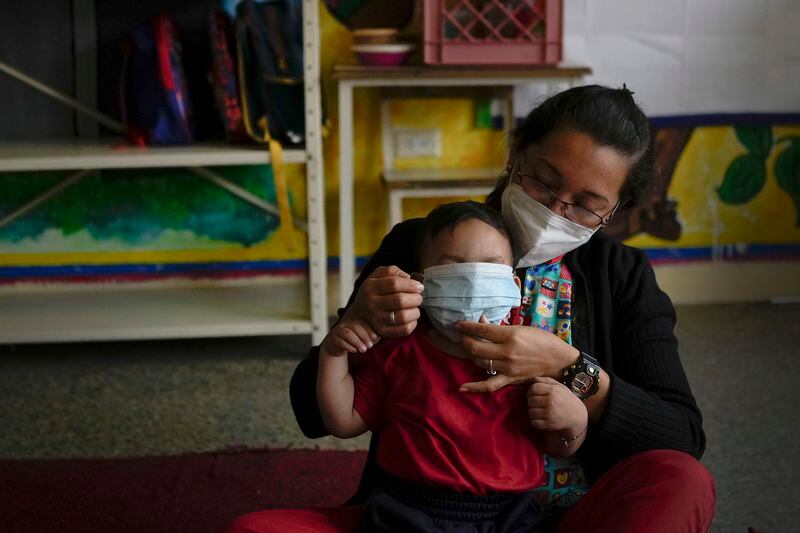Venezuela’s economic crisis is putting its public education system under scrutiny. Very low salaries push teachers and professors to look for other jobs. Today’s students have more days off than classes and leave high school with major academic gaps.
In 80% of Venezuelan schools, students only go to class two or three days a week. And it’s not because we don’t want to, but because in this Caribbean country there are not enough teachers. The start of the new school year was accompanied by the extension of a practice that had begun in the middle of the previous one: working according to a “mosaic schedule”, a modality that reduces school activity, as Edgar puts it Machado, president of the School Teachers Union,” Caracas explained to RFI in Spanish. “The teacher who previously went five days a week, working 40 hours, now only comes two or three days, depending on the agreement reached with the parents and representatives. Some schools have tried to be open all week and, for example, teach first, second and third grades on Mondays, Wednesdays and Fridays; and fourth and fifth on Thursdays and Fridays.
The heart of the problem is that teachers do not have enough income. As of November 2023, a teacher at the top of the salary scale earns 450 bolivars per month, the equivalent of $0.43 per day. This is a figure well below the poverty line set in 2011 by the World Bank, of $1.9 per day. But these are teachers with more than a decade of service. Less experienced teachers earn just $0.32 per day. “Teachers want to work five days,” admits Machado, “but we want our salary to be enough to cover basic needs. »
The lowest paid teachers in Latin America
The last time the state adjusted the salaries of the nation’s educators was in March 2022, and the result fell far short of the union’s aspirations. The entire year of 2023 has been marked by continued protests by teachers for better salaries, because the ones they receive do not allow them to support their families or even pay for public transportation to get to class. This year’s cumulative inflation has already reached 176% and annualized inflation is 362% through October. “Venezuela has the lowest paid teachers in all of Latin America – says Machado – lower than Cuba and Haiti, which we have always said are the lowest in Latin America.”

But how was “mosaic planning” imposed? For researcher Luisa Pernalete, from the Fe y Alegría Training and Research Center, the proposal arose informally from the authorities themselves, to allow teachers to carry out another activity to obtain additional income. “In November 2022, he explains to RFI, the Ministry of National Education reduced the lesson hour from 45 to 35 minutes. This was so that there would be one group that would have classes in the morning and another in the afternoon. But this has decreased because certain sections have grouped together due to lack of students or teachers.
Only 10 days of lessons per month
What began as an emergency option has spread across the country. Where the ministerial suggestion did not arrive, agreements emerged between teachers and parents. The National Federation of Parents and Representatives estimates that it is applied in 80% of public schools in Venezuela, a significant figure given that the majority of students depend on the public system. According to President Nicolás Maduro, between “80 and 85% of students attend public schools and universities,” which means they must attend 200 days of classes per year. However, in 2023, on average, a child attending school in a “mosaic schedule” has between 8 and 12 days of school per month, and 16 to 20 days of leave.
Then go With the school published a study that found that half of the country’s teachers have other jobs, which they do when they are not teaching. One of them is Raúl Parra, a teacher for 24 years in Caracas and also a physiotherapist and recognizes that “when in 2016 I saw that the money I earned as a teacher was no longer enough, I I had to start doing the other job. » Trade unionist Edgar Machado expands on this point: “We have people who paint nails, others bake cakes, others sell coffee. And the few who own a car even work as taxi drivers.”

Although it had been informally enforced for months, it was not until October 2023 that Education Minister Yelitze Santaella publicly declared the “mosaic calendar” to be illegal. But nothing has really changed since then and the consequences are still borne by the youngest. Dany Pineda is the father of two daughters. The eldest, Daniuska, wants to become a lawyer after completing five years of high school, but recognizes the impact of a poor high school: “Since she started high school, she has only studied mathematics from first grade to the fifth year only for one or two months. . From the first to the fourth year, I did not have a teacher. “She herself admits that she knows nothing about mathematics.” But the picture is completed by his youngest daughter, Daniela, who is in her fourth year of high school, but who has barely set foot in the classrooms “because the first year took place during a pandemic, with remote work. Second, during a pandemic, he only met with teachers. In third place. Now they work two days a week.
Nobody repeats
For her part, Eilyn Márquez says that her son Gabriel, 14, also studies two days a week. “He only sees 6 of the 11 subjects he should. He doesn’t have a chemistry, physics or sports teacher. In last year’s report card, it looks like he took all the subjects, and that’s not true. » And it is forbidden in the Venezuelan education system to defer students. Nobody repeats. “The ministry requires teachers to move children from one level to the next,” Machado explains, “whether they have the necessary knowledge or not. We have young people who graduate and don’t even know how to take dictation. We were able to verify this when a private university required an entrance exam and even 1% did not pass.”
It’s not just the economics of teachers that puts them under control. Students’ homes are also suffering, and so Eilyn Márquez had to transfer her son to a public school when she could no longer afford a private school. Dany Pineda asks her daughters to make do with the little they have because “paying for a private lesson is very difficult and the current economic situation is enough to eat”. “I never thought,” adds Eilyn, “that the teachers I wouldn’t have would be those who teach subjects as basic as Spanish or mathematics. It’s a frustration because you want your child to get a proper education.

For researcher Luisa Pernalete, the consequences of the mosaic schedule and other problems in Venezuelan education show almost immediate consequences, and also open the door to much greater inequality between those who study in private and public schools, and within these, those who manage to have more or fewer days of classes. “Adolescents who are not in school, who do not work or study, are at greater risk of being recruited by criminal gangs. »
From teachers to coffee makers, more profitable
The Federation of Parents and Representatives assures that 27% of students have dropped out of the education system, and the Teachers’ Union has estimated school absences at 40% during the second week of the period which has just started in October 2023. This figure doubled compared to the previous one. and teacher Raúl Parra confirmed this when he told RFI that when he started working in his establishment in the capital, “the school population was 2,200 students and today it does not reach 500. However, he said, those who are absent are found working in popular markets such as carts or hawkers.

Those who are still taking classes do not see their school year assured. The teachers’ union says teacher attrition soared to 70% over the past decade, with a constant drip that doesn’t stop. Machado lists the victims: “The first grade teacher gave birth, and these children will not have school for most of the year because there is no substitute. The fourth and sixth grade teachers resigned. Also in the third year, because he says that selling coffee in a corner earns him in a day what he would earn in a month. A logic that leads researcher Pernalete to ask: “How much heroism can we ask of teachers if salaries do not increase?
For the moment, it seems difficult to change the conditions. The Minister of Education has been saying since 2022 that new collective agreements cannot be discussed because international sanctions have left the government without money. “Answers will be given when the economic conditions are right. Have hope,” the official said as Venezuela’s education system continues to bleed.
Source: Latercera
I’m Scott Moore, a professional writer and journalist based in the US. I’ve been writing for various publications for over 8 years now, and have been working as an author at athletistic for the past five years. My work has been featured by some of the leading sports websites and magazines across Europe.


